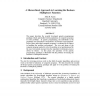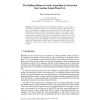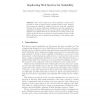834 search results - page 36 / 167 » On the Choice of the Population Size |
106
click to vote
FOGA
1990
15 years 1 months ago
1990
This paper describes the recently developed genetic programming paradigm which genetically breeds populations of computer programs to solve problems. In genetic programming, the i...
111
click to vote
GECCO
2004
Springer
15 years 5 months ago
2004
Springer
The Shifting Balance Genetic Algorithm (SBGA) is an extension of the Genetic Algorithm (GA) that was created to promote guided diversity to improve performance in highly multimodal...
GECCO
2007
Springer
15 years 6 months ago
2007
Springer
In this paper we describe and evaluate a fully distributed P2P evolutionary algorithm (EA) with adaptive autonomous selection. Autonomous selection means that decisions regarding ...
SAC
1998
ACM
15 years 4 months ago
1998
ACM
The fast messy genetic algorithm (fmGA) belongs to a class of algorithms inspired by the principles of evolution, known appropriately as "evolutionary algorithms" (EAs)....
TGC
2007
Springer
15 years 6 months ago
2007
Springer
Web service instances are often replicated to allow service provision to scale to support larger population sizes of users. However, such systems are difficult to analyse because t...



